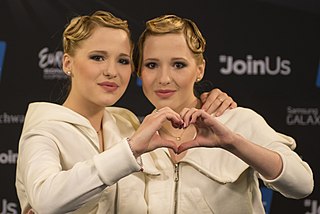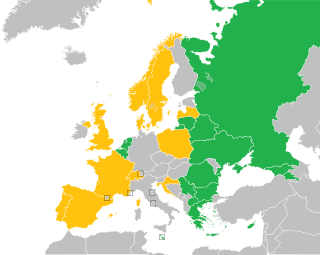
The participation of the Croatia in the Junior Eurovision Song Contest first began at the inaugural Junior Eurovision Song Contest in 2003 which took place in Copenhagen, Denmark. Hrvatska radiotelevizija (HRT), a member organisation of the European Broadcasting Union (EBU), were responsible for the selection process of their participation. Croatia originally used a national selection format for their participation at the contests. The first representative to participate for the nation at the 2003 contest was Dino Jelusić with the song "Ti si moja prva ljubav", which finished in first place out of sixteen participating entries, achieving a score of one hundred and thirty-four points. Croatia first withdrew from competing in the Junior Eurovision Song Contest in 2007. After seven years of absence, Croatia decided to return to the contest in 2014 which was held in Marsa, Malta and selected their entry internally. However after placing last with Josie and the song "Game Over", Croatian broadcaster HRT again withdrew from competing the following year, and have yet to make their return to the contest.

The Netherlands has sent an entry to every Junior Eurovision Song Contest since its creation in 2003. The Netherlands is one of only two countries to have taken part in every Junior Eurovision Song Contest, the other one being Belarus.

Belgium has competed in every Junior Eurovision Song Contest until 2013. The country's best result was in 2009, when Laura Omloop came 4th with "Zo verliefd". Belgium's worst result was in 2007, with Trust coming 15th with "Anders".

Romania have participated in the Junior Eurovision Song Contest since the first Contest in 2003. Their best result came in their second participation, when Noni Răzvan Ene came fourth at the Junior Eurovision Song Contest 2004 with "Îți mulțumesc".

Norway has participated in the Junior Eurovision Song Contest three times, and was the host of the 2004 Contest, where it was held in the Norwegian city of Lillehammer.

The participation of Belarus in the Junior Eurovision Song Contest first began at the inaugural Junior Eurovision Song Contest in 2003 which took place in Copenhagen, Denmark. The Belarusian Television and Radio Company (BTRC) a member organisation of the European Broadcasting Union (EBU) have been responsible for the selection process of their participants since their debut. The first representative to participate for the nation at the 2003 contest was Volha Satsiuk with the song "Tantsuy", which finished in fourth place out of sixteen participating entries, achieving a score of one hundred and three points. Belarus have never missed an edition of the contest, and have won twice in 2005 and 2007. They hosted the contest at the Minsk-Arena in 2010 and again in 2018.

Poland has entered the Junior Eurovision Song Contest five times, competing in the first contest in 2003. The Polish broadcaster Telewizja Polska (TVP) decided to withdraw from the contest after coming last in both 2003 and in 2004, despite TVP signing a 3-year contract with the European Broadcasting Union (EBU). In 2016, it was announced that Poland would return after an 11-year break. Poland won the Junior Eurovision Song Contest for the first time in 2018 with Roksana Węgiel and her song "Anyone I Want to Be".

Russia first competed in the Junior Eurovision Song Contest in 2005. Their first win came in 2006, when the Tomachevy Twins won for Russia with "Vesenniy Jazz". Their second win came in 2017, when Polina Bogusevich won for Russia with "Wings". Their worst result as of date has been achieved by Anna Filipchuk with her song "Unbreakable" in the Junior Eurovision Song Contest 2018 where she placed 10th.

Ukraine took part in the Junior Eurovision Song Contest for the first time in 2006. Their best result came in Junior Eurovision Song Contest 2012 when Anastasiya Petryk won for Ukraine with "Nebo". Her sister Viktoria Petryk came 2nd at the Junior Eurovision Song Contest 2008 with "Matrosy".

The Eurovision Dance Contest was an international dancing competition that was held for the first time in the United Kingdom on Saturday 1 September 2007.

Anastasiya and Maria Andreyevna Tolmachevy are identical twin singers, actresses, and former child singers from the Russian city of Kursk. Aged nine, they won the Junior Eurovision Song Contest 2006 in Bucharest, Romania, with their song Vesenniy Jazz. Eight years later, they represented Russia at the Eurovision Song Contest 2014, placing seventh with the song "Shine".

The Junior Eurovision Song Contest 2008 was the sixth Junior Eurovision Song Contest, which is the world's largest song contest for children. It was held at the "Spyros Kyprianou" Athletic Centre in Lemesos, Cyprus and hosted by Alex Michael and Sophia Paraskeva. It was won by the Georgian trio Bzikebi, with the song "Bzz..". This is the first song to win any Eurovision Song Contest in an imaginary language. Ukraine took 2nd place and Lithuania finished 3rd. Bzikebi also became the first group act to win Junior Eurovision.

The participation of Armenia in the Junior Eurovision Song Contest first began at the Junior Eurovision Song Contest in 2007 which took place in Rotterdam, Netherlands. Armenian Public Television (ARMTV), a member organisation of the European Broadcasting Union (EBU), have been responsible for the selection process of their participants since their debut. The first representative to participate for the nation at the 2007 contest was Arevik with the song "Erazanq", which finished in second place out of seventeen participating entries, achieving a score of one hundred and thirty-six points. Since their debut, Armenia have never missed an edition of the contest and won in 2010 with the song "Mama" by Vladimir Arzumanyan. They hosted the contest at the Karen Demirchyan Complex in 2011. Their worst result to date was achieved by Levon Galstyan at the Junior Eurovision Song Contest 2018 with his song "L.E.V.O.N" where he placed ninth. As of Junior Eurovision 2016, Armenia have awarded and received the most points from Georgia.

The Junior Eurovision Song Contest 2010 was the eighth edition of Junior Eurovision Song Contest and took place in Minsk, Belarus. It was held on 20 November 2010. The contest was won by Vladimir Arzumanyan from Armenia with the song Mama. This gave Armenia its first Junior Eurovision victory and its first victory in any Eurovision contest.
Russia participated in the Junior Eurovision Song Contest 2009 in Kiev, Ukraine. The Russian entry was selected through a national final, organised by Russian broadcaster All-Russia State Television and Radio Company (VGTRK). The final was held on 31 May 2009. Ekaterina Ryabova and her song "Malenkiy prints" won the national final, getting 12.07% of votes.
Denmark were the hosts of the Junior Eurovision Song Contest 2003, the first Junior Eurovision Song Contest held. Denmark was represented by Anne Gadegaard with "Arabiens drøm".
Luara Gurgenovna Hayrapetyan is an Armenian-Russian singer. She represented Armenia at the Junior Eurovision Song Contest 2009 in Kiev, Ukraine with her self-composed pop song "Barcelona", finishing in joint second place.

The Junior Eurovision Song Contest 2019 will be the seventeenth edition of the annual Junior Eurovision Song Contest. It will be held on 24 November 2019, at the Gliwice Arena in Gliwice, Poland, following the country's victory at the 2018 contest in Minsk, Belarus with the song "Anyone I Want to Be", performed by Roksana Węgiel. It will be the first time Poland has hosted the contest, as well as the first Eurovision event to be held in the country since Eurovision Young Dancers 2013.

















